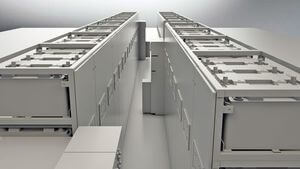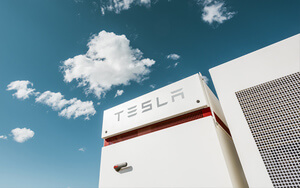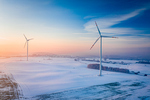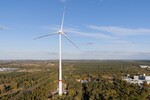News Release from windfair.net
Wind Industry Profile of
The Age of Storage Dawning
In Germany, the name of 'Schwarze Pumpe' (=Black Pump) is generally not at all associated with the energy transition, because it is the name of one of the large lignite-fired power stations in Lusatia in East Germany. But this could soon change. Operator LEAG has now announced that they intend to build a 50 MW electricity storage facility with a storage capacity of 53 MWh at the power plant site in order to contribute to grid stability in the German electricity grid. The storage facility, which is based on lithium-ion technology, will thus be one of the largest battery storage facilities in Europe.
Hubertus Altmann, LEAG Power Plant Board Member, emphasizes the uniqueness of the project: "BigBattery Lausitz is a lighthouse project for LEAG that is unique in Europe in its size and technical constellation. We are thus investing in innovative technologies for the future and expanding our existing plant pool".
 And LEAG is willing to invest big: approx. 25 million euros will flow into the giant battery, with almost four million taken over by the federal state of Brandenburg. "To stabilize the electricity grid, we will use the storage facility on days with high fluctuations in renewable energies. In combination with our existing plants, we can provide various system services and meet the increased requirements of the power grid," Altmann explains the function of the battery (see image to the right, copyright: LEAG).
And LEAG is willing to invest big: approx. 25 million euros will flow into the giant battery, with almost four million taken over by the federal state of Brandenburg. "To stabilize the electricity grid, we will use the storage facility on days with high fluctuations in renewable energies. In combination with our existing plants, we can provide various system services and meet the increased requirements of the power grid," Altmann explains the function of the battery (see image to the right, copyright: LEAG).
Australia is one step ahead, though. This is where the world's largest lithium-ion battery energy storage system, the Hornsdale Power Reserve (HPR), connected to the Hornsdale wind farm is located. It was built a year ago to stabilize the national power grid, facilitate the integration of renewable energies and avoid load losses (e.g. blackouts).
The battery is operated by energy supplier Neoen and Elon Musk's Tesla Group. After one year of operation, Aurecon carried out an independent study to examine the functionality of the project. Conclusion: All project objectives were met and the volatility in the nationwide network was reduced over a period of 12 months. The use of similarly fast storage systems could significantly improve the reliability, affordability and sustainability of energy across Australia.
Paul Gleeson, Energy Leader of Aurecon, explains: "HPR is a game changer for the energy sector and has demonstrated some of the new capabilities we need in the electricity network to successfully integrate greater proportions of renewables as our generation fleet continues to decarbonise over time."
 The project (see image left, copyright: Aurecon) is an important factor for the further progress of the energy transition: "HPR is a first step in terms of an immediate response to creating stability in a network which has a rapidly growing proportion of variable renewable energy. As the penetration of renewable energy increases in Australia, it’s critical for us to find cost effective ways to make renewable power dispatchable and integrated into the grid. What has been done here by the SA Government, Neoen and Tesla is the type of innovative and forward-thinking approach that we are going to need more of in the years ahead."
The project (see image left, copyright: Aurecon) is an important factor for the further progress of the energy transition: "HPR is a first step in terms of an immediate response to creating stability in a network which has a rapidly growing proportion of variable renewable energy. As the penetration of renewable energy increases in Australia, it’s critical for us to find cost effective ways to make renewable power dispatchable and integrated into the grid. What has been done here by the SA Government, Neoen and Tesla is the type of innovative and forward-thinking approach that we are going to need more of in the years ahead."
BigBattery Lausitz will soon be performing similar functions: An innovative charging management system and the use of a novel power plant control system will be integrated. Loading and unloading will be based on the conditions in the electricity grid and the electricity markets. "In order to stabilise the electricity grid, we will use the storage facility on days with high fluctuations in renewable energies. In combination with our existing generation facilities, we will be able to provide various system services and meet the increased requirements of the electricity grid," says Altmann.
Certainly there will remain a slightly unpleasant aftertaste when this type of storage facility is connected to an existing coal-fired power plant. Nevertheless, the role model from Australia shows the undeniable success: "It has exceeded expectations and told us a significant amount about how we can integrate an increasing proportion of renewables into the National Electricity Market (NEM)," says Gleeson.
- Author:
- Katrin Radtke
- Email:
- press@windfair.net
- Keywords:
- Lusatia, Germany, lignite-fired power station, Kohlekraftwerk, LEAG, Schwarze Pumpe, Tesla, Australia, storage, battery, Aurecon, Hornsdale Power Reserve, BigBattery Lausitz























